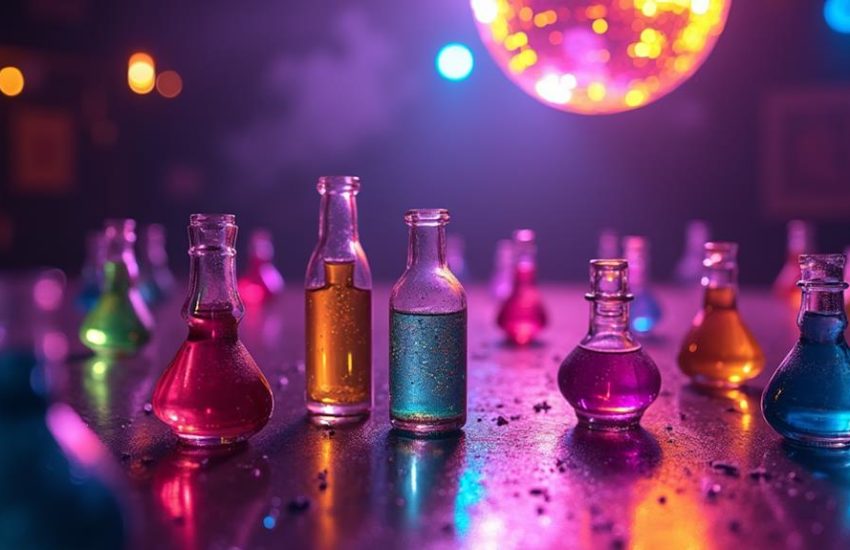Dizzy, Weak, and Fainting: The Scary Side Effects of Poppers You Need to Know
Poppers, a class of inhalant drugs primarily composed of alkyl nitrites, can cause alarming side effects. Users may experience immediate dizziness, weakness, and fainting as a result of sudden drops in blood pressure. These symptoms are often accompanied by severe headaches, rapid heart rate, and disorientation. Short-term risks include nausea, chest pain, and temporary vision problems. Long-term use can lead to cardiovascular complications, neurological damage, and potential blindness. The dangers intensify when poppers are combined with other substances, particularly erectile dysfunction medications or alcohol. Understanding these risks is essential for those considering or currently using poppers. Further exploration reveals safer alternatives and prevention strategies.
What Are Poppers?

Curiosity often surrounds the topic of poppers, a class of inhalant drugs primarily composed of alkyl nitrites.
These volatile liquids, typically sold in small bottles, are inhaled for their euphoric and muscle-relaxing effects. Poppers gained popularity in the LGBTQ+ community during the 1970s and remain a fixture in certain social circles today.
The chemical composition of poppers primarily includes amyl nitrite, butyl nitrite, or isobutyl nitrite. When inhaled, these substances rapidly enter the bloodstream, causing a brief but intense rush of sensation.
Their recreational use is often associated with nightlife, movement culture, and sexual encounters. In spite of their widespread availability, poppers are not without risks.
Users should be aware of potential side effects and legal implications, as the sale and use of poppers are regulated differently across various jurisdictions.
Short-Term Health Risks

Though poppers can induce temporary feelings of euphoria, they likewise carry several immediate health risks. The short-term effects of popper use can be alarming and potentially dangerous.
Users may experience dizziness, severe headaches, and rapid heart rate within seconds of inhalation. Immediate symptoms often include facial flushing, nausea, and disorientation, which can lead to fainting or loss of consciousness. In some cases, individuals may suffer from chest pain or difficulty breathing.
The sudden drop in blood pressure caused by poppers can be particularly hazardous for those with pre-existing cardiovascular conditions. Moreover, users may experience temporary vision problems, including blurred or spotty vision.
Chronic use has been linked to significant respiratory issues, including decreased lung function and increased risk of pulmonary problems. These immediate health risks underscore the importance of understanding the potential consequences of popper use, even though the effects are short-lived.
Long-Term Complications

Though the immediate effects of popper use can be alarming, the long-term complications pose even greater concerns for users' health. Prolonged exposure to alkyl nitrites, the active compounds in poppers, can lead to severe cardiovascular effects and neurological damage.
Regular users may face an increased risk of:
- Heart palpitations and irregular heartbeat
- Reduced blood oxygen levels
- Weakened immune system
- Vision problems, including potential blindness
- Cognitive impairment and memory loss
These long-term complications underscore the significance of understanding the risks associated with popper use. The cumulative effects on the cardiovascular system can lead to heart disease and stroke, whereas neurological damage may result in permanent cognitive deficits.
Users should be aware that the temporary high comes at a potentially steep cost to their long-term health and well-being. Repeated use can additionally result in chronic issues like nerve damage and severe respiratory distress.
Seeking support and alternatives is essential for those struggling with popper use.
Interactions With Other Substances

When poppers are combined with other substances, the potential for dangerous interactions increases considerably.
Erectile dysfunction medications, such as Viagra or Cialis, can have severe reactions with poppers, leading to a dangerous drop in blood pressure. Alcohol consumption during the use of poppers may intensify the effects and increase the risk of fainting or dizziness.
In spite of the poppers' legality in some regions, combining them with other drugs can lead to unpredictable and potentially life-threatening consequences.
Throughout poppers' history, their use has often been associated with other recreational substances, particularly in nightclub settings. This combination can amplify the risks of cardiovascular complications and respiratory distress.
It's essential for users to be aware that mixing poppers with stimulants like cocaine or amphetamines can place excessive strain on the heart, potentially leading to cardiac events or stroke.
Users have additionally reported muscle twitching and tremors linked to popper use, further highlighting the potential health risks.
Safer Alternatives and Prevention

Given the significant risks associated with poppers and their interactions with other substances, exploring safer alternatives and prevention strategies is vital.
Natural remedies and lifestyle changes can provide healthier options for those seeking relaxation or improved experiences. For instance, incorporating antioxidant-rich supplements such as Blueberry Eye Bright, Ginkgo, Omega Oils, and Vitamin E can be beneficial for overall well-being.
Consider these alternatives:
- Meditation and mindfulness practices
- Regular exercise and physical activity
- Aromatherapy with important oils
- Engaging in creative pursuits or hobbies
- Exploring safe, consensual intimacy techniques
Prevention involves education and awareness about the dangers of poppers. Individuals should prioritize their health and well-being by avoiding these substances altogether.
For those struggling with substance use, seeking professional help and support from friends and family is vital. Implementing stress-reduction techniques and developing healthy coping mechanisms can as well reduce the desire to use poppers or other harmful substances.
Call Us To Assist You
Poppers pose significant health risks regardless of their popularity in certain communities. From immediate side effects like dizziness and fainting to potential long-term complications affecting vision and blood pressure, their use warrants serious consideration. How can users balance perceived benefits against these dangers? Education on safer alternatives and prevention strategies is vital. In the end, understanding the full spectrum of poppers' effects empowers individuals to make informed decisions about their health and well-being. Further research and open dialogue remain fundamental in addressing this complex issue.


